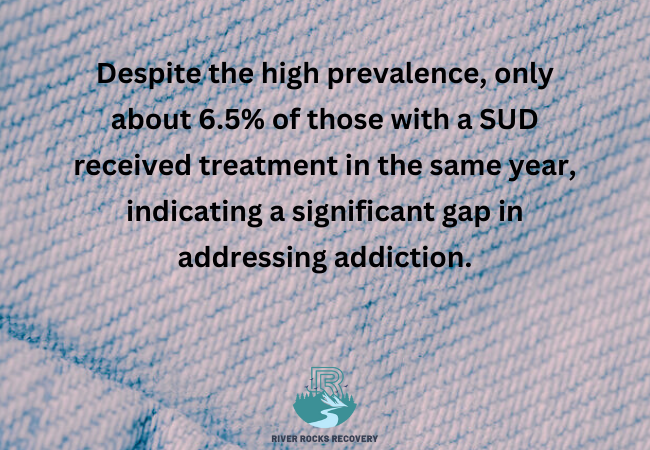Drug addiction can be difficult to recognize, especially for individuals who may be in denial about their substance use. Many people start using drugs recreationally or as a way to cope with stress, trauma, or pain, but what begins as occasional use can quickly spiral into dependency. Without professional treatment, addiction can lead to serious health risks, damaged relationships, and legal or financial trouble.
If you or a loved one is struggling with substance abuse, understanding the warning signs is the first step toward seeking treatment. At River Rocks Recovery, we provide comprehensive drug rehab treatment in Ohio, helping individuals overcome opioid addiction, methamphetamine use, and other substance dependencies through structured programs.
In This Guide, We Will Cover:
- The early warning signs of drug addiction
- The physical, emotional, and behavioral effects of substance abuse
- The risks of delaying professional treatment
- How to assess whether you or a loved one needs rehab
- Treatment options available in Ohio for long-term recovery
If you’re unsure whether rehab is necessary, this guide will help you recognize the red flags and take the first step toward lasting recovery.
Understanding the Progression of Drug Addiction
Substance use disorder (SUD) develops in stages, progressing from casual drug use to dependency and full-blown addiction. Understanding this progression can help individuals and families identify addiction before it becomes life-threatening.
Stages of Addiction:
- Experimentation – Trying drugs for curiosity, peer pressure, or fun.
- Regular Use – Increased frequency of use, often in social settings.
- Risky Use – Using despite negative consequences (relationship problems, legal trouble).
- Dependence – Experiencing withdrawal symptoms when not using.
- Addiction – Loss of control, compulsive drug-seeking behavior, and inability to stop despite harm.
The sooner addiction is recognized and addressed, the higher the likelihood of successful treatment and recovery.
Warning Signs That You Need Drug Rehab
Addiction affects every aspect of life, including physical health, emotions, relationships, and decision-making. Below are the most common red flags that indicate a need for professional rehab.
1. Physical Signs of Addiction
Chronic drug use impacts the body in various ways, often causing:
- Sudden weight loss or gain
- Bloodshot eyes, dilated or pinpoint pupils
- Frequent nosebleeds (from snorting substances like cocaine or methamphetamine)
- Track marks, bruises, or scars from injecting drugs
- Tremors, sweating, or flu-like withdrawal symptoms
- Neglect of personal hygiene and appearance
2. Behavioral Changes Due to Addiction
Substance abuse rearranges priorities, causing individuals to act out of character:
- Increased secrecy and lying about drug use
- Missing work, school, or family commitments
- Stealing money or valuables to buy drugs
- Risky behavior, such as driving under the influence
- Spending excessive time with people who also use drugs
3. Emotional and Psychological Warning Signs
Addiction causes mood instability and often coexists with mental health disorders:
- Severe mood swings, aggression, or paranoia
- Depression, anxiety, or panic attacks
- Loss of motivation and interest in hobbies
- Hallucinations or delusions (in cases of stimulant or opioid abuse)
- Thoughts of self-harm or suicide
4. Increased Tolerance and Withdrawal Symptoms
One of the most clear indicators of addiction is tolerance and withdrawal:
- Tolerance – Needing higher doses to achieve the same effect.
- Withdrawal – Experiencing nausea, tremors, sweating, chills, or severe cravings when attempting to quit.
These signs indicate physical dependence, making it dangerous to quit without medical supervision.
The Dangers of Delaying Drug Rehab
Ignoring addiction does not make it go away. In fact, delaying treatment can lead to severe consequences, including:
1. Increased Health Risks
- Higher risk of overdose (especially with opioids and fentanyl-laced drugs).
- Heart, liver, and kidney damage from prolonged substance abuse.
- Infectious diseases (HIV, hepatitis C) from sharing needles.
2. Damage to Relationships and Career
- Trust issues and conflicts with family and loved ones.
- Job loss and financial instability due to absenteeism or poor performance.
- Legal consequences (DUIs, arrests, or criminal activity to support drug use).
3. Worsening Mental Health
- Depression, anxiety, and suicidal thoughts intensify.
- Feelings of hopelessness and being unable to escape addiction.
The longer substance abuse continues, the harder it becomes to quit without professional help.
How to Know When It’s Time for Rehab
If you’re unsure whether rehab is necessary, ask yourself:
- Have I tried to quit but failed multiple times?
- Do I experience withdrawal symptoms when not using?
- Is drug use affecting my work, relationships, or finances?
- Have I put myself or others in dangerous situations due to substance use?
- Do I feel like I can’t stop on my own?
If you answered yes to any of these questions, it’s time to seek professional treatment.
Comprehensive Drug Rehab Treatment in Ohio
At River Rocks Recovery, we offer personalized treatment programs to help individuals break free from addiction.
1. Opiate Rehab Treatment in Ohio
- Specialized treatment for heroin, fentanyl, and prescription opioid addiction.
- Medication-assisted treatment (MAT) to manage withdrawal and cravings.
2. Meth Rehab Treatment in Ohio
- Comprehensive care for methamphetamine addiction.
- Behavioral therapy and relapse prevention to build long-term coping strategies.
3. Partial Hospitalization Program (PHP) in Ohio
- Intensive, structured treatment with medical and psychological support.
- Ideal for those who need more than outpatient care but not full residential rehab.
4. Intensive Outpatient Program (IOP) in Ohio
- Flexible treatment schedule for individuals balancing work or family responsibilities.
- Individual and group therapy to address addiction triggers.
5. Outpatient Program (OP) in Ohio
- Long-term support for relapse prevention.
- Weekly therapy sessions to help individuals maintain sobriety.
How River Rocks Recovery Can Help
At River Rocks Recovery, we provide comprehensive addiction treatment that includes:
- Medical detox for safe withdrawal.
- Evidence-based therapy (CBT, DBT, trauma-informed care).
- Personalized treatment plans for each individual.
- Relapse prevention and aftercare support for long-term success.
At River Rocks Recovery, we are dedicated to helping individuals break free from addiction through comprehensive drug rehab programs in Ohio, including:
- Opiate Rehab Treatment
- Meth Rehab Treatment
- Partial Hospitalization & Intensive Outpatient Programs
- Relapse Prevention & Long-Term Aftercare
If you or a loved one is struggling with drug addiction, don’t wait to seek help. The sooner you begin treatment, the better the chances of lasting recovery.
Conclusion
Recognizing the warning signs of addiction is the first step toward reclaiming control over your life. Drug addiction is a progressive disease that, if left untreated, can cause severe health risks, damaged relationships, financial trouble, and even life-threatening consequences. However, recovery is always possible with the right support and professional treatment.
If you or a loved one is experiencing physical withdrawal symptoms, loss of control over drug use, behavioral changes, or declining mental health, it’s time to seek professional rehab services. The sooner you begin treatment, the greater your chances of achieving long-term sobriety.
Addiction doesn’t have to define your future. You have the power to take back your life, and we’re here to guide you every step of the way. Call River Rocks Recovery at 888.905.6281 today for a confidential consultation. Recovery starts with one decision—take the first step today.
FAQ About Recognizing the Need for Drug Rehab
How do I know if I need drug rehab?
If you experience withdrawal symptoms, loss of control over drug use, cravings, or negative impacts on work, relationships, and health, you may need professional rehab. Seeking treatment early increases your chances of successful recovery.
What are the warning signs of drug addiction?
Common signs include:
- Physical changes (weight loss, bloodshot eyes, poor hygiene)
- Behavioral changes (missing work/school, secrecy, financial issues)
- Emotional struggles (depression, mood swings, paranoia)
- Increased tolerance and withdrawal symptoms when not using
Can I quit drugs on my own, or do I need rehab?
Quitting alone can be dangerous, especially for opioids, meth, and other addictive substances. Withdrawal symptoms can be severe and even life-threatening. Medically supervised detox and therapy help ensure a safe and lasting recovery.
What happens if I ignore the signs of addiction?
Ignoring addiction can lead to serious consequences, including:
- Overdose or life-threatening withdrawal symptoms
- Legal and financial problems
- Strained relationships with family and friends
- Worsening mental and physical health
What treatment options are available for drug addiction in Ohio?
At River Rocks Recovery, we offer:
- Opiate Rehab Treatment in Ohio
- Meth Rehab Treatment in Ohio
- Partial Hospitalization Program (PHP)
- Intensive Outpatient Program (IOP)
- Outpatient Program (OP) for relapse prevention
When should I seek professional help for addiction?
If drug use is affecting your health, relationships, finances, or daily life, it’s time to seek help. If you have tried quitting but relapsed, or if you experience withdrawal symptoms, professional rehab can provide the support you need to recover.





























